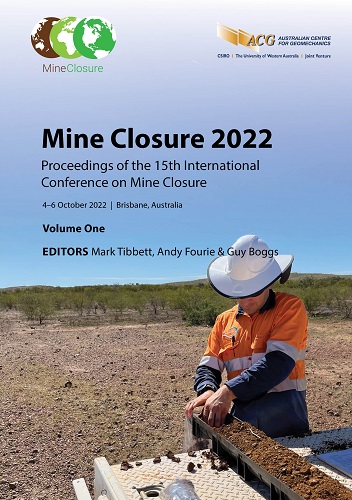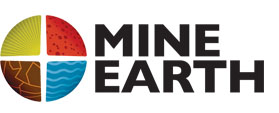Social licence to operate through mine closure transition: lessons from theory and practice

|
Authors: Wilson, C; Mandke, P; Harding, L |
DOI https://doi.org/10.36487/ACG_repo/2215_11
Cite As:
Wilson, C, Mandke, P & Harding, L 2022, 'Social licence to operate through mine closure transition: lessons from theory and practice', in AB Fourie, M Tibbett & G Boggs (eds), Mine Closure 2022: Proceedings of the 15th International Conference on Mine Closure, Australian Centre for Geomechanics, Perth, pp. 199-206, https://doi.org/10.36487/ACG_repo/2215_11
Abstract:
Effective and meaningful participation in the mine closure planning process is a commonly prescribed goal of leading industry best practice guidance. The expected outcome is a social licence to operate for the companies, sustainable regions for governments and lasting legacies for communities. However, the extent to which this objective translates into practice is not well understood conceptually or empirically. In this paper, we draw on both literature and project experience to outline conceptual factors that are understood to contribute to a social licence to operate during mine closure processes. Specifically, we outline how social impact assessment (SIA) can be used as a practical tool to assist mine companies achieve and maintain what we term a ‘social licence to close’ during mine closure processes and provide examples of the application of SIA in successful closure planning programs. We argue that systematic and research-driven consultation and collaboration with stakeholders, anchored within the SIA process, is a powerful tool to gain trust, understand impacts of closure specific to each stakeholder group and develop meaningful and effective measures for transition to a post-mining future. This paper will be of interest to industry practitioners seeking to optimise their closure efforts from a social performance perspective.
Keywords: mine closure, social licence to operate, social impact assessment, stakeholder engagement
References:
Bainton, N & Holcombe, S 2018, ‘A critical review of the social aspects of mine closure’, Resources Policy, vol. 59, pp. 468–478.
Boele, R 2018, ‘Introduction: trust in business’, in KPMG (ed.), Maintaining a Social Licence to Operate: 2018 KMPG AICD Trust Survey, viewed 18 May 2022,
Chaloping-March, M 2008, ‘Business expediency, contingency and socio-political realities — a case of unplanned mine closure’, in AB Fourie, M Tibbett, I Weiersbye & P Dye (eds), Mine Closure 2008: Proceedings of the Third International Seminar on Mine Closure, Australian Centre for Geomechanics, Perth, pp. 863-871,
Cheshire, L, Everingham, J-A & Pattenden, C 2011, ‘Examining corporate-sector involvement in the governance of selected mining-intensive regions in Australia’, Australian Geographer, vol. 42, no. 2, pp. 123–138.
Esteves, AM, Franks, D & Vanclay, F 2012, ‘Social impact assessment: the state of the art’, Impact Assessment and Project Appraisal, vol. 30, no. 1, pp. 34–42.
Everingham, J-A 2016, ‘Transformations of rural society and environments by extraction of mineral and energy resources’, in M Shucksmith & DL Brown (eds), Routledge International Handbook of Rural Studies, Routledge, London, pp. 272–298.
Everingham, J-A, Svobodova, K, Mackenzie, S & Witt, K 2020, Participatory Processes, Mine Closure and Social Transitions, Centre for Social Responsibility in Mining, The University of Queensland, Brisbane.
Gillespie, N, Bond, CJ, Downs, V & Staggs, J 2016, ‘Stakeholder trust in the Queensland CSG industry’, The APPEA Journal, vol. 56, no. 1, pp. 239–246.
Gunningham, N, Kagan, R & Thornton, D 2004 ‘Social licence and environmental protection: why businesses go beyond compliance’, Law & Social Inquiry, vol. 29, no. 2, pp. 307–341.
International Council on Mining and Metals 2019, Integrated Mine Closure: Good Practice Guide, 2nd edn, International Council on Mining and Metals, London.
Keenan, J 2020, Examining Mine Closure Through the Lens of Industry Social Practitioners, Centre for Social Responsibility in Mining, The University of Queensland, Brisbane.
Kemp, D & Owen, J 2019, Establishing the Foundations for Effective Social Performance in the Global Mining Industry, Centre for Social Responsibility in Mining, Sustainable Minerals Institute, The University of Queensland, Brisbane.
Kemp, D, Worden, S & Owen, J 2016, ‘Differentiated social risk: Rebound dynamics and sustainability performance in mining’, Resources Policy, vol. 50, pp. 19–26.
Lacey, J & Lamont, J 2014, ‘Using social contract to inform social licence to operate: an application in the Australian coal seam gas industry’, Journal of Cleaner Production, vol. 84, pp. 831–839.
Lamb, K & Coakes, S 2012, ‘Effective social planning for mine closure’, in AB Fourie & M Tibbett (eds), Mine Closure 2012: Proceedings of the Seventh International Conference on Mine Closure, Australian Centre for Geomechanics, Perth, pp. 627-639,
Luke, H 2017, ‘Social resistance to coal seam gas development in the Northern Rivers region of Eastern Australia: proposing a diamond model of social license to operate’, Land Use Policy, vol. 69, pp. 266–280.
Mercer-Mapstone, LD, Rifkin, W, Moffat, K & Louis, W 2018, ‘What makes stakeholder engagement in social licence “meaningful”? Practitioners’ conceptualisations of dialogue’, Rural Society, vol. 27, no. 1, pp. 1–17.
Moffat, K, Lacey, J, Zhang, A & Leipold, S 2016, ‘The social licence to operate: a critical review’, Forestry: An International Journal of Forest Research, vol. 89, no. 5, pp. 477–488.
Moffat, K & Zhang, A 2014, ‘The paths to social licence to operate: an integrative model explaining community acceptance of mining’, Resources Policy, vol. 39, pp. 61–70.
Morrison, TH, Wilson, C & Bell, M 2012, ‘The role of private corporations in regional planning and development: opportunities and challenges for the governance of housing and land use’, Journal of Rural Studies, vol. 28, no. 4, pp. 478–489.
Owen, J & Kemp, D 2013, ‘Social licence and mining: a critical perspective’, Resources Policy, vol. 38, no. 1, pp. 29–35.
Owen, J & Kemp, D 2018, Mine Closure and Social Performance: An Industry Discussion Paper, Centre for Social Responsibility in Mining, Sustainable Minerals Institute, The University of Queensland, Brisbane.
Petrova, S & Marinova, D 2013, ‘Social impacts of mining: changes within the local social landscape’, Rural Society, vol. 22, no. 2, pp. 153–165.
Prno, J & Slocombe, DS 2012, ‘Exploring the origins of “social license to operate” in the mining sector: perspectives from governance and sustainability theories’, Resources Policy, vol. 37, no. 3, pp. 346–357.
Thomson, I & Boutilier, RG 2011, ‘Social license to operate’, in P. Darling (ed.), SME Mining Engineering Handbook, Society for Mining, Metallurgy and Exploration, Littleton, pp. 1779–1796.
Vanclay, F 2003, ‘International principles for social impact assessment’, Impact Assessment and Project Appraisal, vol. 21, no. 1,
pp. 5–12.
Vivoda, V, Kemp, D & Owen, J 2019, ‘Regulating the social aspects of mine closure in three Australian states’, Journal of Energy & Natural Resources Law, vol. 37, no. 4, pp. 405–424.
Walton, A & McCrea, R 2020, ‘Understanding social licence to operate for onshore gas development: how the underlying drivers fit together’, Applied Energy, vol. 279, no. 115750.
Weller, S, Beer, A, Porter, J & Veitch, W 2020, Identifying measures of success for a global best-practice thermal coal mine and thermal coal-fired power station closure – Final Report, UniSA Business, Adelaide.
Wilson, C, Morrison, TH, Everingham, JA & McCarthy, J 2018, ‘Capture and crush: gas companies in the fracking dispute and deliberative depoliticization’, Geoforum, vol. 92, pp. 106–116.
Zandvliet, L & Anderson MB 2009, Getting it Right: Making Corporate-Community Relations Work, Greenleaf Publishing Limited, Sheffield.
© Copyright 2026, Australian Centre for Geomechanics (ACG), The University of Western Australia. All rights reserved.
View copyright/legal information
Please direct any queries or error reports to repository-acg@uwa.edu.au
View copyright/legal information
Please direct any queries or error reports to repository-acg@uwa.edu.au
